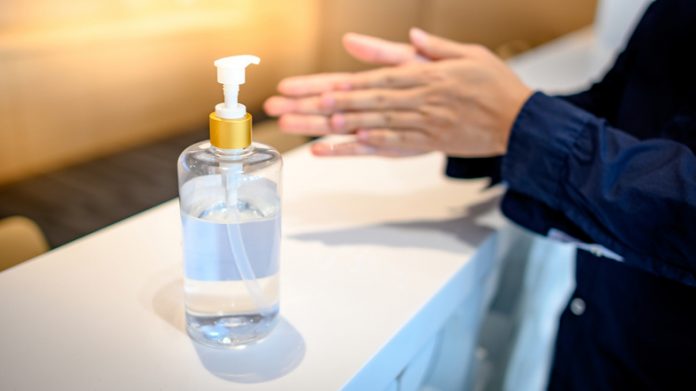As hotels prepare for the spread of COVID-19, there are some precautions managers and staff can take to improve guest and employee health and safety. Early evidence suggests that the virus that causes COVID-19 can spread more easily than the virus that causes seasonal influenza, and it appears that the COVID-19 disease is more deadly than seasonal influenza.
Use Pre-Approved Disinfectant Products
Switch to and use disinfectant products that have been pre-approved by the U.S. Environmental Protection Agency (EPA) for use against emerging viral pathogens. Disinfectants should be applied during routine cleaning of guestrooms, public spaces, health club areas and meeting rooms. Here is the current list of disinfectants with EPA pre-approval.
Linens may become contaminated with the virus, so it is also important to add disinfectant when washing laundry. Bed scarves and bedspreads should be washed more frequently.
Train housekeeping staff to use the disinfectants safely and correctly. Staff should wear gloves when cleaning. Many of these cleaning products need to remain on hard surfaces for several minutes in order to work. Follow the manufacturer’s instructions for proper use to get the most virus killing protection. Schedule and perform routine cleaning and disinfection of all contact surfaces in public areas and guestrooms: television remote controls, toilet flush handles, door handles, water faucet handles, and flooring.
Clean Public Spaces Frequently
Public spaces and the front desk need to be cleaned frequently. If possible, provide disposable disinfectant wipes to front-of-house staff to disinfect surfaces between guests. High-touch areas in public spaces include tables in the lobby area and buttons on elevators, water fountains, and ice and vending machines. Pens at the front desk and room keys and key cards should also be cleaned with disinfectant.
Remind Staff and Guests to Keep Hands Clean
Train hotel staff and post signage to remind guests and workers to wash hands with soap and warm water frequently, for at least 20 seconds each time. If possible, provide alcohol-based hand sanitizer that contains at least 60 percent alcohol in all guest contact areas and to all staff. In addition, staff should be advised not to touch their faces and to practice “social distancing” by standing at least three feet away from guests and other workers.
Educate Staff on Coronavirus Symptoms
Educate staff on the most common signs and symptoms of coronavirus infection, which are fever, dry cough, and shortness of breath. Symptoms typically occur one to 14 days after exposure, though a small proportion of people who are infected don’t have symptoms.
Keep Records of Guest and Staff Movement
Maintain records that will help trace who has been in contact with any infected individuals that have been to your property. Review and implement a record keeping process to maintain records of guest and staff movement. These records should be kept for a minimum of 90 days. This includes maintaining guest registration records, employee work assignments, documentation of key control procedures including the electronic lock records, and security camera closed circuit tapes. This is especially important if someone in your hotel has been confirmed to have the virus.
Stay Informed and Consult With Local Health Departments
Stay informed with updated and credible information on the COVID-19 virus and follow the information listed by the CDC, which also includes information on where the virus has spread in the United States and globally.
Consult with the local and county health departments to determine appropriate actions if a guest or worker presents symptoms of COVID-19 disease, as well as how to respond if asked to quarantine guests. Public health officials at the state, federal, and local level have the legal authority to implement control measures to prevent the spread of communicable disease, such as isolation and quarantine, travel restrictions, and medical treatment. A public health emergency can be declared by state (e.g., the governor or state public health officer) or federal (Secretary of Health and Human Services) authorities, which would allow for actions like property confiscation for use in response or emergency approvals for unapproved drugs. This includes restricting movement within a hotel and placing a quarantine on a hotel property. The CDC has more information on this.
RESOURCES
American Chemistry Council, Center for Biocide Chemistries: Novel coronavirus (COVID-19)-fighting products
CDC: Coronavirus disease 2019 (COVID-19) situation summary
International Journal of Contemporary Hospitality Management: “Does hotel cleanliness correlate with surfaces guests contact?” by Haeik Park, Sheryl F. Kline, Jooho Kim, Barbara Almanza, and Jing Ma
U.S. Department of Labor, Occupational Safety and Health Administration: COVID-19 control and prevention
World Health Organization: Getting your workplace ready for COVID-19











